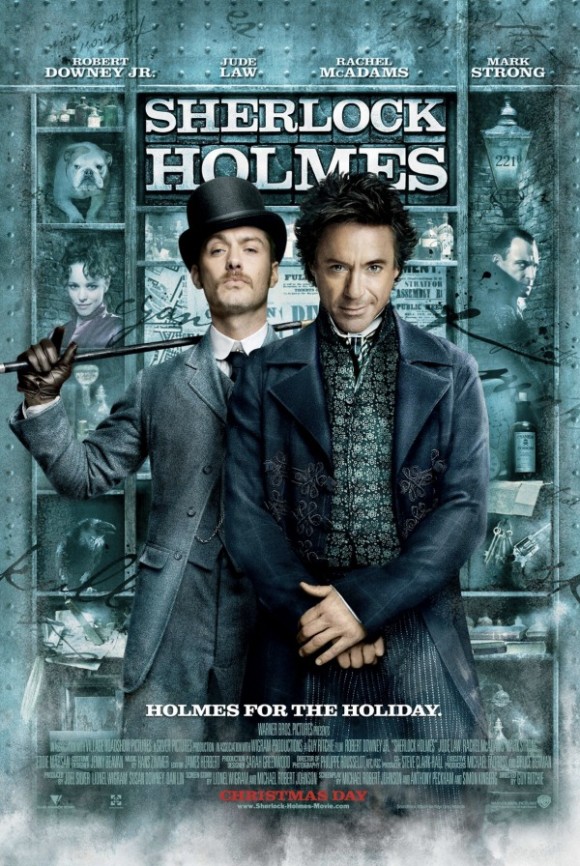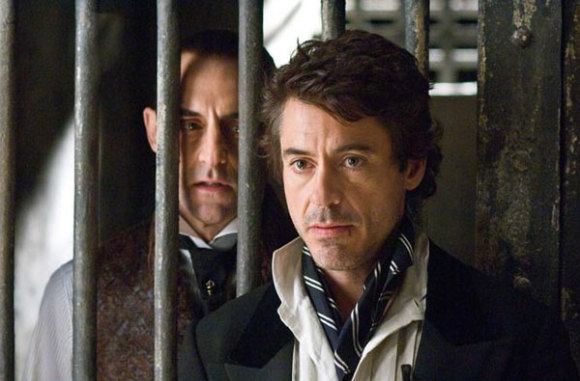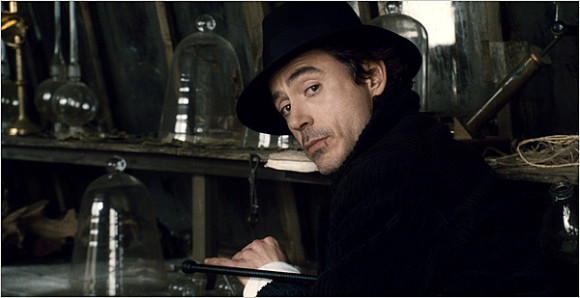Deducing the Limits of Reason
 The new Sherlock Holmes was exciting, intriguing, and yet....it didn’t quite leave me satisfied for some reason. Robert Downey Jr’s character showed an interesting side of the greatly loved detective, portraying his uncanny gift of reason as almost a constant form of internal torture rather than completely a gift. Sure, he utilizes his talents well, both to solve cases, win fights, and keep himself and others alive. But when he’s alone it is most evident that Sherlock is tormented by his constantly working mind. If his thinking mind does not have an object to be fully utilized for, it sinks to whatever it can muster, or Sherlock Holmes can never stop thinking.
The new Sherlock Holmes was exciting, intriguing, and yet....it didn’t quite leave me satisfied for some reason. Robert Downey Jr’s character showed an interesting side of the greatly loved detective, portraying his uncanny gift of reason as almost a constant form of internal torture rather than completely a gift. Sure, he utilizes his talents well, both to solve cases, win fights, and keep himself and others alive. But when he’s alone it is most evident that Sherlock is tormented by his constantly working mind. If his thinking mind does not have an object to be fully utilized for, it sinks to whatever it can muster, or Sherlock Holmes can never stop thinking.
It was interesting how the filmmakers were able to portray his mind through their artistic choices. The shot selection and composition as well as editing style and pacing all worked together to clearly portray Holmes’ mind. The story often cut back and forth from flashbacks, stylized monologues complete with small details, and other techniques to show that Holmes’ doesn’t necessarily think linearly, but his mind moves beyond that to whatever is necessary to arrive at the logical conclusion. The audience, as well as Watson and many other characters, are forced to catch up to the conclusions Holmes (and therefore the film) makes and acts upon, supplying us with the necessary information later.
The filmmakers were able to capture this style so well, that I think it was precisely their success that led to my general dislike of the film. Downey Jr’s character was just hard for me to like, and therefore the portrayal of his character through the film itself was also unfortunately lacking my approval. I am in awe, though, at how well they were able to make the film as they did though, and heartily recommend others to see it. I think it was merely a personal dislike of the character, for a reason I’m not quite sure of, that caused the general dissatisfaction.
My personal taste aside, the case itself brought up many interesting questions. I rather enjoyed how Holmes was able to figure out the case, as I so like Holmes stories for that very reason. (Though I was beginning to wonder how many fights were necessary to solve the case...) The choice to pit Holmes, the epitome of reason, against that requiring mere faith and belief, magic and dark arts, was a very interesting one. Throughout the film, Holmes must constantly decide whether or not he can rely on reason to guide him, or if he must give up on reason and believe. It begged the question asked for centuries, can reason defeat religion?
Quickly noticing the central question, I began to wonder. Would Holmes give in and have to believe in the illogical to solve the case, conceding that reason is not enough? Would logic triumph over religion, since Holmes is the main character, and religion and faith be shown to be useless and unfounded, merely a tool for control?
And while the answer turned out to be closer to the latter option, it was still a little different. In this story, there was never any magic at all, merely illusions and tricks to cause fear. So, yes it was a tool for control and was conquered by reason, but the question was never if religion itself was beaten and if belief was necessary, but it was rather if Holmes or Blackwood had the superior reason to defeat the other. It was merely a case to be solved and not a treatise on whether belief or reason was superior.
One is left, though, looking at the broken Holmes, constantly suffering, and wondering if belief could save him somehow. His reason obviously can only lead him so far, he needs more in his life, and it makes one wonder if faith would help him. Would it fulfill what reason cannot? These questions are left unanswered, but my heart ached for this Sherlock to find something to give him something more to live for than just his next case.
After writing this post, I like this film significantly more. There is certainly more there than I first realized, and going through it makes me realize that what I didn’t like is what the movie is lacking anyway, an answer to why reason isn’t enough. But it does a great job at showing the power of reason and how it works in a man like Holmes. And I must applaud the film for not throwing in an obligatory sex scene, because it simply wasn’t necessary anyway, and though opportunities for it were present, the filmmakers wisely did without.
I recommend this film to all who want to see good filmmaking, an entertaining story, excellent deduction, and have a good time through it all. Happy viewing!





